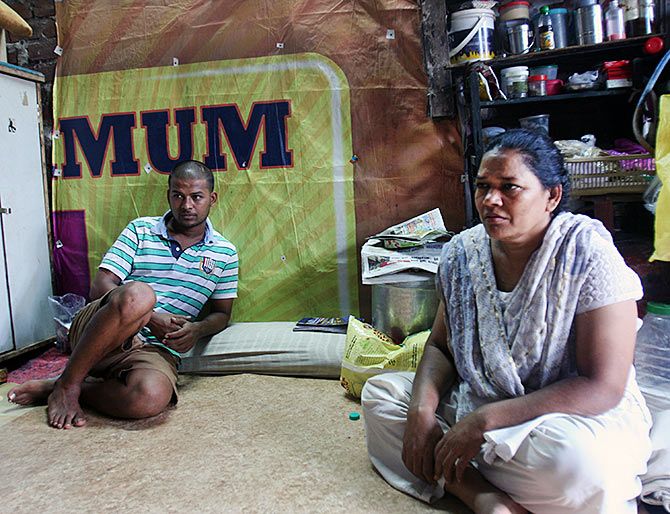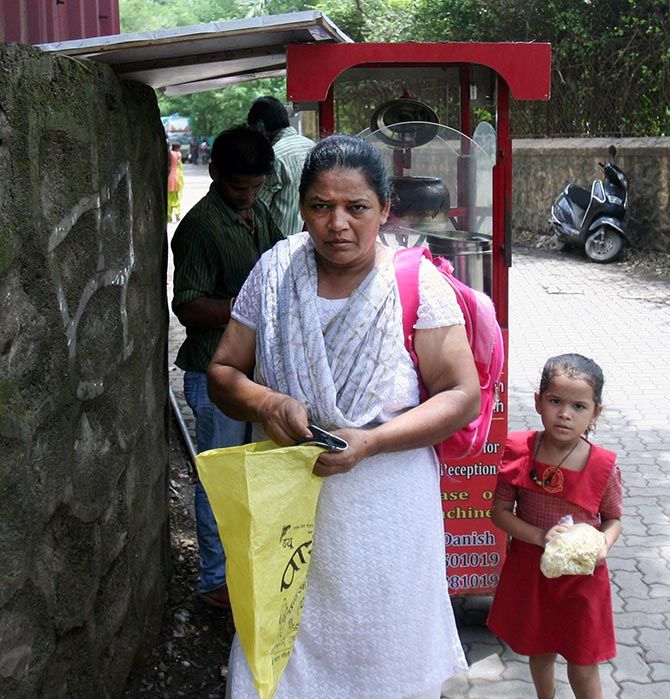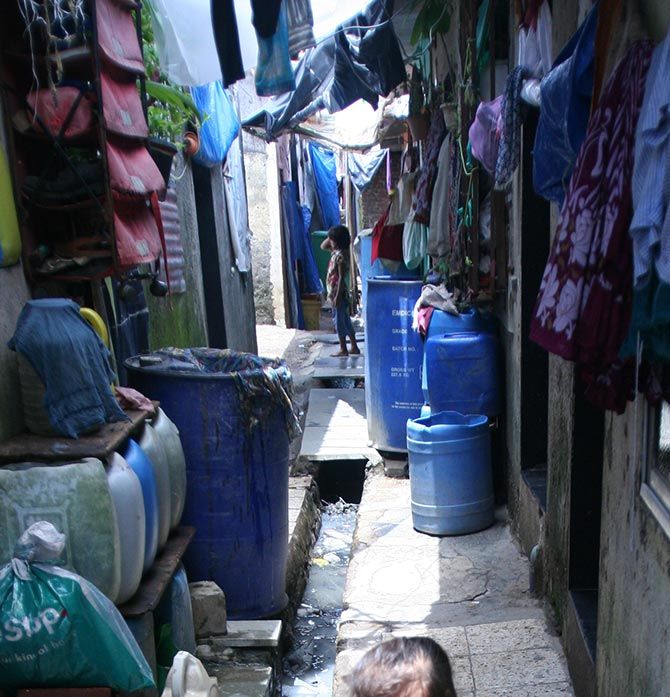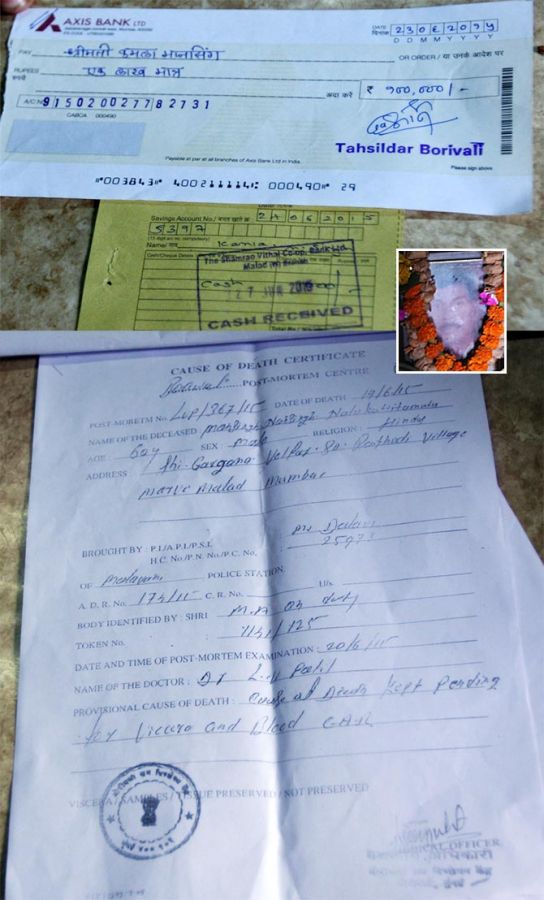Kamla Singh lost her husband to the spurious liquor that claimed 104 lives in Mumbai last month.
Rediff.com meets a family that longs for "a very nice man" who, alas, will never return. The second part in our ongoing series on the Mumbai hooch tragedy.
Text: Prasanna D Zore and Reuben NV; Photographs: Reuben NV

We meet Kamla Singh, whose husband succumbed in the Malvani hooch tragedy, by chance. "Go to J P High School and ask anybody about those who died and they will show you the way," Ashish Das had told us.
As we walk in lanes that can accommodate just two people at any given moment, we encounter Alka Gangurde, who directs us to Kamla Singh.
- For more about Alka Gangurde and Ashish Das, please read: In a dark, dingy, slum, families cope with Mumbai's hooch tragedy
With her granddaughter in tow, Singh, who is in her early 40s, takes us to her home, approximately a 10 minute walk from the Sir J P High School, the only place where the road is the widest, and hence teeming with people.
"Machli jaise tadap rahe the (he was writhing, like a fish out of water)," Kamla Singh tells us, echoing Ashish Das while describing the effects the poison-laced alcohol had on her husband Maan Singh.
The fact that two people, unknown to each other, who faced similar tragedies, used the same Hindi phrase vividly describes the suffering of those 104 men who died drinking poisonous liquid that was concentrated methyl alcohol.
On June 18, Maan Singh did not feel like going to work. That rain-lashed day, he left home at 8.30 am to be with his friends and returned home around noon, intoxicated. By 2 pm, he began vomiting. "He did not eat anything solid that afternoon. He drank some daal and went to sleep," recalls Kamla Singh.
When Maan Singh woke up at 6 pm, his body was cold. He said his chest was aflame, a description Ashish Das's father had used in a conversation with his wife hours before he perished.
By early morning, her husband's condition had deteriorated further. "He complained of severe body ache, his lips turned blue and his eyes were bloodshot; he kept vomiting," Kamla Singh remembers.

At 6 am, Rajendra, the youngest son, rushed his father to the Shatabdi Hospital on a neighbour's motorcyle. By 7 pm that evening, Maan Singh was dead.
After a post-mortem, Singh's body was taken home. "His body was kept right here, where you are sitting," his wife tells us.
***
"He was a very nice man," Kamla Singh says of her late husband. As the chowkidaar at the Billabong High School in Malvani he would often get tips from "saablog," she says. "He would come home; hand over all the tips to me, then take some amount from me to have his drink," she recalls pensively.
Singh had joined the school in April as a watchman.
The Singh household -- a family of ten with two sons, Vikrant and Mahendra (both older than Rajendra), their wives and their three children; youngest sister Suman is married and stays in Malvani -- live in a 200 square feet concrete tenement.
The family was happy that Mann Singh, who earlier worked odd jobs, would now earn a fixed salary of Rs 9,000 per month, working at the school.
Natives of Kathmandu, the Singh couple have lived in Mumbai for more than two decades. With income from ancestral farmland in Nepal, Vikrant and Mahendra's earnings (Rajendra was not working then) and a little savings, the family bought their current house some ten years ago for Rs 2 lakh (Rs 200,000). The cost of their home in 2015 has appreciated to Rs 10 lakh (Rs 1 million).

"We own the house. This is our home," Kamla Singh says, looking at her husband's garlanded photograph, which is kept against a wall. "Our children play out there," she says, pointing towards the narrow lane. The lane outside is crowded with drums that store water for daily needs; clothes hung outside by Singh's neighbour to dry in the sun; and a flowing gutter.
"This is our world," says Rajendra, 25, who quit his job as a driver after his father's death. "My mother sent Mahendra to Kathmandu for some work; Vikrant has a permanent job; so I quit to perform the post-cremation religious rites," he says, confident that he will get a job in a month or so.
***

Four days after Maan Singh's death, the family was called to the local revenue office where Kamla Singh was handed a cheque of Rs 100,000, which the government offered the victims's families. Like Meena Das in the first part of our series, Kamla too does not have a bank account. But unlike Meena Das, the Singhs have their identity proof documents in place.
Asha Dhose, Kamla's neighbour, helped her with the bank formalities and the account was opened last week. The cheque was deposited with Dhose's help.
"Without Asha's help and help from our neighbours we would not have been able to cope with the tragedy," says Kamla Singh.
"Will our cheque bounce?" she asks us, expressing doubts about the compensation the state government has given her. "I have been asking this to everybody," she says.
"Don't worry," we assure her. "It has been issued by the government. There is no question of the cheque bouncing."
Kamla Singh looks relieved, and smiles for the first time.










